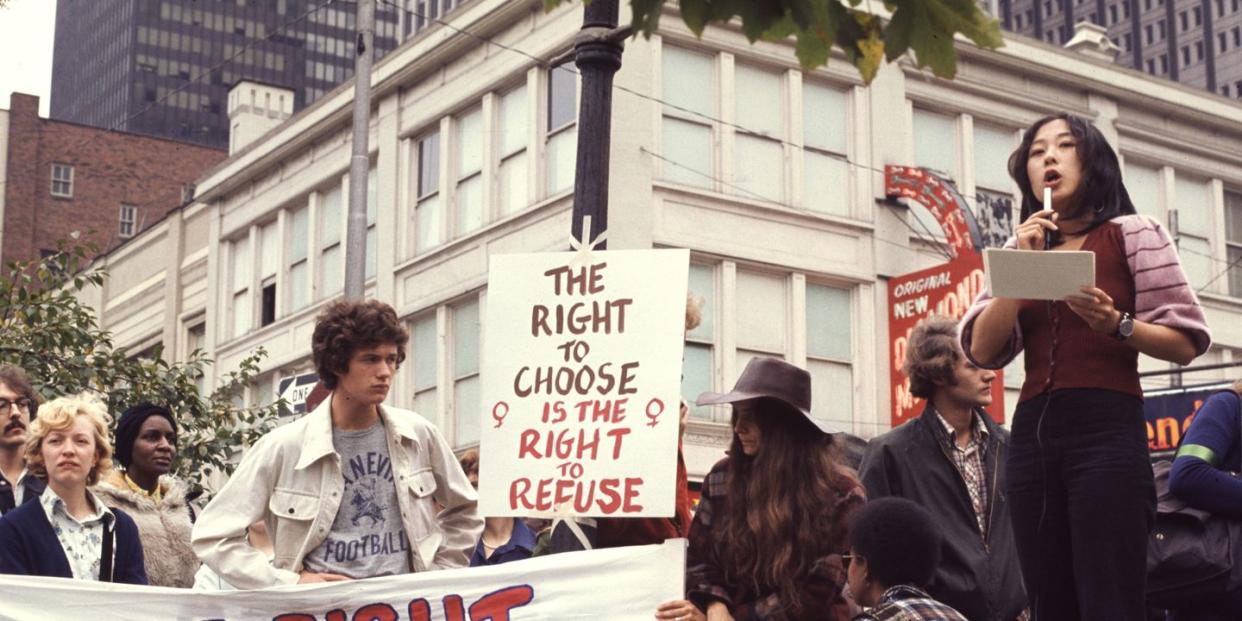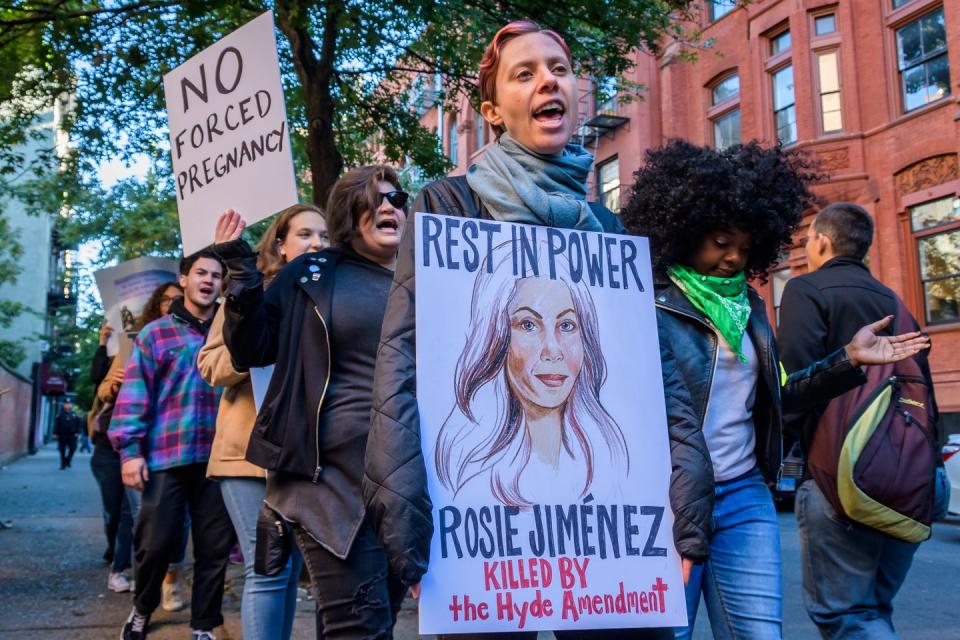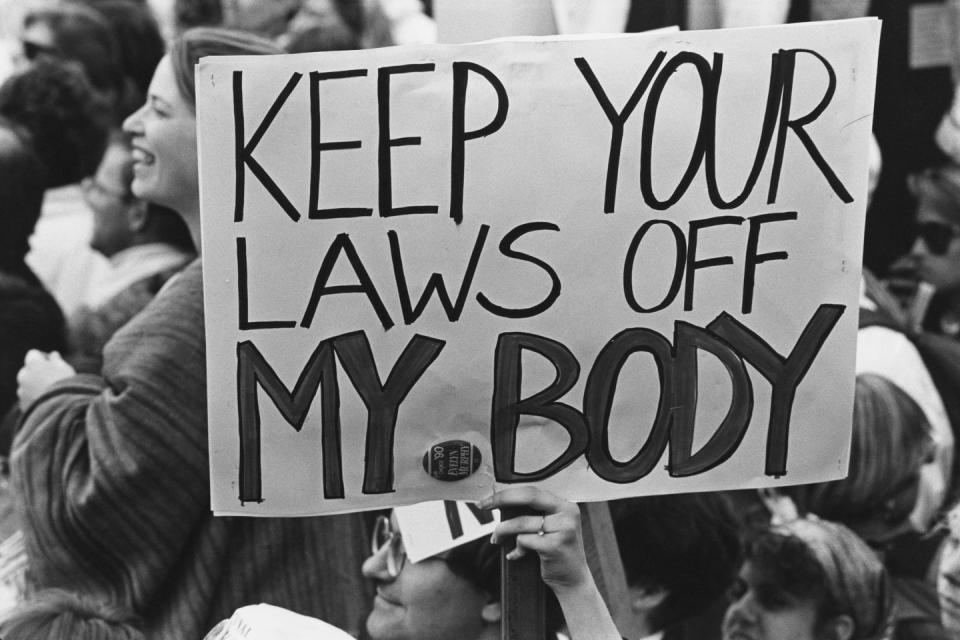How the Hyde Amendment Hearing Can Affect the Future of Abortion Rights

Over the course of more than four decades, Congress has annually renewed the Hyde Amendment, a highly controversial measure that reproductive rights activists say keeps abortion inaccessible to marginalized communities. That could all change, however, as the House Appropriations Committee held a historic, virtual hearing yesterday on the disproportionately negative impacts of the amendment.
Simply put, the Hyde Amendment broadly bars federal funding for abortion costs, meaning Medicaid recipients—who overwhelmingly come from communities of color or low-income communities—lack abortion coverage. Since the measure's 1976 passing, Congress has extended the amendment to also apply to federal employees and their dependents, Native Americans, immigrants, Washington, D.C., residents, Peace Corps volunteers, those who are incarcerated or held in immigration detention facilities, and military personnel, according to Planned Parenthood. A 2009 report from the Guttmacher Institute found that 25 percent of women who "who would have Medicaid-funded abortions instead give birth when this funding is unavailable."
The fight to end the Hyde Amendment has been a long one, spearheaded by women of color and organizations like All* Above All, which kicked off the #BeBoldEndHyde movement. Now, as the movement builds on unprecedented support for the measure's repeal, and as Joe Biden and Kamala Harris—both of whom have publicly rejected the provision, though Biden only recently rescinded his support of the amendment during the 2019 Democratic primary presidential race—prepare to enter the White House come January, some activists are hopeful for the future. Biden and Harris also join a growing number of elected officials, like House Speaker Nancy Pelosi and incoming Appropriations Chair Rosa DeLauro, in supporting an end to the provision.
To fully grasp the destructive reach of the Hyde Amendment and the building momentum to finally eliminate it, BAZAAR.com reached out to All* Above All's co-director Destiny Lopez and some of the testifiers at the historic House hearing: Dr. Herminia Palacio, the president and CEO of Guttmacher Institute; and Dr. Jamila Perritt, the president and CEO of Physicians for Reproductive Health. Read on to learn more about what they had to say about the next frontier in the battle for reproductive freedom.
What is the Hyde Amendment?
Jamila Perritt: The Hyde Amendment is a discriminatory policy that blocks those relying on federally funded health programs from getting coverage for abortion care. This includes people receiving their insurance coverage via Medicaid, the military, the Indian Health Service, people receiving care in federal prisons and detention centers, D.C. residents, federal employees, and Peace Corps volunteers. It is a rider to the annual appropriations bill for the Department of Health and Human Services, and Congress has voted to pass the annual spending bill with this rider attached almost every year since its passage in 1976.
Destiny Lopez: For 44 years, anti-abortion politicians have used the Hyde Amendment to deny insurance coverage of abortion for people who are enrolled in Medicaid. Since it was initially passed in 1976, the harms of the Hyde Amendment have been extended to also deny abortion coverage for federal employees, Native and Indigenous people, women in detention, and residents in Washington, D.C.
The Hyde Amendment is one of the prime examples of why Roe v. Wade, which established legal abortion in the United States, has never been enough for people working to make ends meet.
Herminia Palacio: By design, the Hyde Amendment targets people with low incomes—and, in particular, people of color with low incomes—for harmful and discriminatory treatment.
For 44 years, the Hyde Amendment has denied abortion coverage to people enrolled in Medicaid. Removing such blatantly coercive, racist, and demeaning language is a critical step toward ensuring people can get the abortion care they need.

How does it disproportionately affect Black and Latinx communities, and other marginalized communities?
DL: The Hyde Amendment falls hardest on communities who are already marginalized by our health care system, and disproportionately impacts Black, Indigenous, and people of color by denying them the ability to control their lives, bodies, and futures, and to live with dignity and economic security.
The impact of the Hyde Amendment is now compounded by the COVID-19 pandemic, which has resulted in job loss and economic insecurity, exacerbated health inequities, and killed Black, Latinx, and Native people at vastly disproportionate rates. It's also important to recognize that Hyde, like police violence, wage gaps, inequities exposed by COVID-19 this year, is rooted in systemic racism that denies the humanity of Black, Indigenous, and people of color, and the ability to thrive in their own communities.
We also know that when politicians restrict Medicaid coverage of abortion, they force one in four poor women seeking an abortion to carry an unwanted pregnancy to term. And when a woman wants to get an abortion but is denied, she is more likely to fall into poverty.
JP: Barriers to abortion care like the Hyde Amendment disproportionately impact those who already face the most barriers in our health system, including Black women, Indigenous women, other people of color, young people, transgender and nonbinary people, LGBTQIA people, and those living in rural communities. Especially in the midst of a pandemic that is inequitably impacting communities of color, it is more important than ever that we address the historically racist policies denying people access to basic, essential health care.
HP: The harmful burdens of the Hyde Amendment are intentionally and unjustly imposed on Black and Brown people, and on people with low incomes. In other words: people who have been historically marginalized.
Because of the legacy of systemic racism in this country, Black and Brown women are disproportionately likely to be insured through Medicaid: 31 percent of Black women and 27 percent of Hispanic women aged 15 to 44 are enrolled in Medicaid, compared with 16 percent of white women. As our country undergoes a racial reckoning, I want to be clear: The Hyde Amendment is a racist policy.
The United States has the highest maternal mortality rate among developed countries, with dramatic but preventable racial inequities. Black and Indigenous women’s maternal mortality rates are two to three times the rate of white women.
Reflect on these overlapping and perverse indignities: The Hyde Amendment disproportionately withholds abortion coverage from Black and Brown communities—a potential consequence of which is being forced to continue a pregnancy in a system in which Black and Indigenous people are astonishingly more likely to die.
What is the status of Hyde right now?
DL: While the Hyde Amendment remains in the current federal spending bill, the momentum to end it once and for all has never been higher.
On the federal level, the EACH Woman Act—a groundbreaking bill, led by U.S. Senator Tammy Duckworth in the Senate and U.S. representative Barbara Lee in the House, that would ensure public and private coverage—is up to 207 co-sponsors. Earlier this year, U.S. representatives Ayanna Pressley, Alexandria Ocasio-Cortez, Barbara Lee, and Jan Schakowsky filed an amendment to strip Hyde from the federal spending bill, and as she said this week, U.S. representative Rosa DeLauro has committed to ending the Hyde Amendment in next year’s federal spending bill.
Locally, elected officials have declared their support for abortion coverage, and lawmakers in cities like Austin and New York have stepped up for the second consecutive year to dedicate funding within their city budgets to practical support for abortion care. Maine and Illinois are the latest two states to ensure insurance coverage for abortion for folks in their respective states.
The majority of national voters—62 percent—support Medicaid coverage of abortion.
HP: Across 34 states and the District of Columbia, the Hyde Amendment leaves seven million women who are already struggling financially without abortion coverage. On average, an abortion at 10 weeks costs around $550, which could be someone’s entire rent payment. And the cost increases over time. Contrast that with the fact that—even before the current recession—37 percent of Americans said they would struggle to cover an emergency expense of $400, for any purpose.
JP: While the Hyde Amendment is currently in place, Congress and the Biden–Harris administration have an opportunity to end the Hyde Amendment by ensuring a clean budget, passing clean appropriations bills, and moving forward with legislation like the EACH Woman Act. The EACH Woman Act would prohibit politicians from interfering with personal health care decisions through sneaky coverage restrictions that deny people struggling financially the ability to get the affordable abortion care they need. Abortion care should be made accessible to all people regardless of where they live or how much they make. Pregnant people and their families should have full access to the care they need as decided only by themselves with support from medical providers, not politicians.
Why is the House’s December 8 hearing on the amendment so important?
DL: This week's hearing has been years in the making, all thanks to the power, strength, and voices of women of color who have been leading the movement to end the Hyde Amendment for decades. The hearing also demonstrates the strong commitment from elected officials to end the Hyde Amendment in next year's federal spending bill.
We also heard from three powerhouse women of color who are dedicated to ending abortion coverage bans and fighting for the dignity, well-being, and economic security of the folks that they serve.
HP: Looking ahead to the 117th Congress and the Biden administration, the historic significance of this hearing on the Hyde Amendment cannot be overstated. Congresswoman DeLauro was selected by her colleagues to chair the full Appropriations Committee starting next year, and we are especially encouraged by the clear commitments she and her subcommittee colleagues have made to lift the harmful and discriminatory Hyde Amendment and support abortion coverage for all.
JP: We have ignored the real, devastating harms of the Hyde Amendment for decades. When people don’t have access to the abortion care they need, their well-being and the well-being of their families and communities are negatively impacted. It was an honor to testify alongside my colleagues Dr. Herminia Palacio and Amanda Beatriz Williams as we collectively shared the harms of the Hyde Amendment and our vision for a future where all people can access the health care they need, no matter the source of their insurance.
What happens if Congress decides to lift the Hyde amendment?
JP: When we end the Hyde Amendment, abortion care will be treated like the basic, essential health care it is. Insurance coverage of abortion should be comparable to other essential health care services. Abortion should not be singled out for exclusion or have additional burdens placed upon it.
DL: Ending the Hyde Amendment in the federal spending bill helps ensure that people working to make ends meet can get the abortion care that they need, and gets us one step closer to a future where each of us can live, work, and make decisions about our health and our future with dignity and economic security.
We are also calling on President-elect Biden to demonstrate his commitment to ending Hyde by introducing a presidential budget without this policy, and appoint cabinet nominees that have a strong commitment to protecting and expanding reproductive health care, economic justice, and racial justice.
HP: Repealing Hyde is a necessary step to dismantle systemic racism and ensure that our public policies support bodily autonomy and safe, healthy communities. Repealing the Hyde Amendment would mean greater equity in insurance coverage for abortion, and it would be an important step in making abortion care more available for those who want and need it. But the fight to protect and expand abortion rights and access does not stop there. Both federal and state policymakers must do much more to roll back harmful restrictions and short up and expand abortion rights.
What happens if it doesn’t?
HP: Hyde would continue to pose a major barrier to accessing care for people with low incomes—and an insurmountable one for many of them.
Abortion patients include people of every race, religion, political affiliation, and socioeconomic group, and the majority are already parents. One in four cisgender women in the United States will have an abortion in their lifetime. Likewise, trans men and gender-nonconforming individuals require access to the full range of pregnancy-related care. Overall, 75 percent of abortion patients in the United States are low-income, and the majority are people of color.
Many people with low incomes experience delays accessing abortion care because of the time and effort needed to pull together funds. People get caught in a cruel cycle, in which delays associated with raising the money leads to additional costs and subsequent delays.

A literature review conducted by Guttmacher concluded that among women with Medicaid coverage subject to the Hyde Amendment, one in four who seek an abortion are forced to continue the pregnancy.
Forcing someone who wants an abortion to continue a pregnancy is not only a violation of their reproductive autonomy; it is tantamount to requiring them, against their wishes, to accept the risks of pregnancy- and labor-related complications, including preeclampsia, infections, and death.
JP: We will continue to operate under a two-tiered system of health care where some people get the health care they need and others don’t. This is absolutely egregious, and we cannot accept health care access being dictated by one’s income, socioeconomic status, and zip code.
DL: If Congress does not act and end the Hyde Amendment, people struggling financially and who are already marginalized will continue to bear the brunt of this harmful policy.
We are calling for a future where each of us can live our lives with dignity, respect, and economic security, and the women of color who have led this movement from the beginning will continue our work until Hyde is no more.
This interview has been edited and condensed for clarity.
12/11/20: This story has been updated to include answers from All* Above All, an organization that has been instrumental in the fight to repeal the Hyde Amendment.
You Might Also Like

